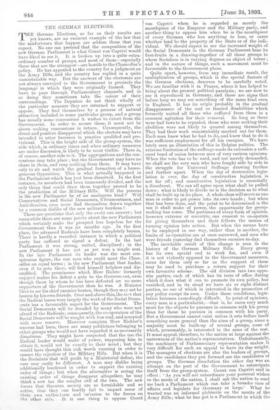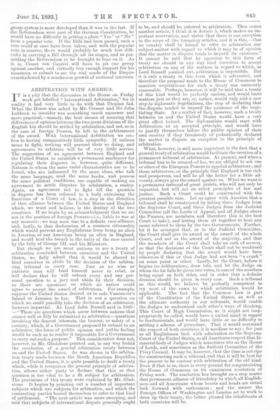THE GERMAN ELECTIONS. T HE German Elections, so far as their
results are yet known, are an eminent example of the law that the misfortunes that happen are seldom those that you expect. No one can pretend that the composition of the new German Parliament is what Count von Caprivi would have liked to see it. It is broken up into a quite extra- ordinary number of groups, and most of them—especially those that are the strongest—are hostile to the Chancellor's policy. He has appealed to the country for a judgment on the Army Bills, and the country has replied in a quite unmistakable way. But the answers of the electorate are not always conveyed to the Government in precisely the language in which they were originally framed. They have to pass through Parliamentary channels, and in so doing they sometimes take the colour of their surroundings. The Deputies do not think wholly of the particular measure they are returned to support or -oppose. They find themselves by a process of natural attraction included in seine particular group, and a group has usually some concessions it wishes to extort from the Government. In order to secure these, it must not be above making concessions in return. Consequently, the direct and positive disapproval which the electors may have intended to utter becomes in practice qualified and pro- visional. This is the bright side of the group-system, the side which, in ordinary times and when ordinary measures are under discussion, is likely to be most visible. There is, of course, another side to it. The aggregations and the con- -cessions may take place ; but the Government may have no share in them, and reap nothing from them. It may have only to sit and watch the gradual formation of a homo- geneous Opposition. This is what actually happened in the Parliament which has just been dissolved. In the first instance, its members had been immensely divided, and the only thing that could draw them together proved to be the production of the Military Bills. Will the process in the new Parliament be of an analagous kind ? Will Conservatives and. Social Democrats, TJltramontanes, and Anti-Semites, once more find themselves drawn together by a common dislike of the new military burdens P. These are questions that only the event can answer ; but meanwhile there are some points about the new Parliament which certainly make the prospect less hopeless for the Government than it was six months ago. In the first place, the advanced Radicals have been completely beaten. • There is hardly a recorded instance in which a political party has suffered so signal a defeat. In the last Parliament it was strong, united, disciplined ; in the new Parliament it has not as yet won a single seat. In the late Parliament its leader was the most con- spicuous figure, the one man who could meet the Chan- cellor on equal terms ; in the new Parliament that leader, even if he gets there, will find himself helpless and die- credited. The prominence which Herr Richter formerly enjoyed makes his defeat a gain to the Govermi. ent, even though those by whom he has been defeated an no more supporters of the Government than. he was. .A Minister likes to see his chief enemies beaten, though they may not be beaten by his own friends. Over and above this, the la et that the Radical losses were largely the work of the Social Demo- crats has a favourable aspect for the Government. The Social Democrats will be dreaded by many who were not afraid of the Radicals; consequently,the co-operation of the Social Democrats will be sought with less zeal, and accepted with more reserve. However complete Herr Richter's success had been, there are many politicians belonging to other groups who would not have regarded it as necessarily disastrous. They might have suspected, that the use the Radical leader would make of power, supposing him to obtain it, would not be exactly to their mind ; but they would have thought this risk worth running in order to ensure the rejection of the Military Bills. But when it is the Socialists that will profit by a Ministerial defeat, the case may easily be different. A man may dislike being additionally burdened in order to support the existing order of things ; but when the alternative is seeing the existing order of things disappear altogether, he may think a new tax the smaller evil of the two. The new forces that threaten society are so formidable and so active, that they can hardly fail to impart some of Their own enthini Ism and co‘iesion to the forces on the other side. It is one thing to oppose Count von Caprivi when he is regarded as merely the mouthpiece of the Emperor and the Military party, and another thing to oppose him when he is the mouthpiece of every German who has anything to lose, or cares whether land be the property of the State or of the indi- vidual. We should expect to see the increased weight of the Social Democrats in the German Parliament bear its first-fruits in a drawing-together of all those groups to whom Socialism is in varying degrees an object of terror ; and in the nature of things, such a movement must be favourable to the Government plans. Quite apart, however, from any immediate result, the multiplication of groups, which is the special feature of the German elections, deserves to be carefully noted. We are familiar with it in France, where it has helped to bring about the present political paralysis ; we are now to see it reproduced in Germany, and there are signs that before long we may see something of the same kind even in England. It has its origin probably in the gradual disappearance of the real or fancied disabilities which formerly united all those who suffered from them in a common agitation for their removal. So long as there were bad laws to be repealed, those who were seeking their abolition were not likely to quarrel among themselves. They had their work unmistakably marked out for them. Each man knew what he had to do, and knew that to do it was sufficient employment for all his energies. We have lately seen an illustration of this in Belgian politics. The extreme limitation of the suffrage made its extension a suffi- cient bond of union between men of very various opinions. When the vote has to be used, and not merely demanded, we shall see the very men who have fought side by side in the struggle for Universal Suffrage drawing further and further apart. When the day of destructive legis- lation is over, the day of constructive legislation is not far off ; and constructive legislation is essentially dissolvent. We can all agree upon what shall be pulled down ; what is likely to divide us is the decision as to what shall be built up in its place. A whole class will move as one man in order to get power into its own hands ; but when that has been done, and the point to be determined is the use it shall make of power, the opportunity for group- making has come. The partisans of every form of opinion, however extreme or eccentric, can consent to co-operate for giving themselves and their fellows the means of turning opinion into action. But when the means have to be employed in one way, rather than in another, the limits of co-operation are at once narrowed, and men who were friends yesterday find themselves enemies to-day. The inevitable result of this change is seen in the history of the German Military Bills. Every group has its own special end to work for, and even if it is not violently opposed to the Government measures, cares for them only so far as the support of them may be used to purchase a return support for their own favourite scheme. The old division into two oppo- site parties, each of which has its term of office during which it does what it can to promote its own policy, has vanished, and in its stead we have six or eight distinct parties, no one of which is interested in the promotion of any policy except its own. Under these conditions, legis- lation becomes exceedingly difficult. In point of opinions, every man is a particularist,—that is, he cares very much more for the objects be pursues in common with his group than for those he pursues in common with his party. But a Government cannot exist unless it sets before itself something more general than the aims of a group, since a majority must be built-up of several groups, none of which, presumably, is interested in the aims of the rest. It must appeal, therefore, to the nation at large against the narrowness of the nation's representatives. Unfortunately, the machinery of Parliamentary representation makes it very difficult for such an appeal to have its due weight. The managers of elections are also the leaders of groups, and the candidates they put forward are the candidates ot groups. The German dissolution the other day was an attempt on the part of the Government to emancipate itself from the group-system. Count von Caprivi said in effect : As you will not subordinate your personal wishes to the needs of the nation, I shall ask the nation to send me back a Parliament which can take a broader view of affairs and legislate for Germany at large.' What he wanted was an informal plebiscite on the merits of the Army Bills ; what he has got is a Parliament in which the group-system is more developed than it was in the last. If the Referendum were part of the German Constitution, he would have no difficulty in getting a plain "Yes" or" No" from a popular vote. If the Bills had been passed, such a vote could at once have been taken, and with the popular vote in reserve, there would probably be much less diffi- culty in carrying a Bill through all its stages, and so per- mitting the Referendum to be brought to bear on it. As it is, Count von Caprivi will have to pit one group against another, and virtually buy enough support for his measures, or submit to see the real needs of the Empire overshadowed by a mushroom growth of sectional interests.



















































 Previous page
Previous page